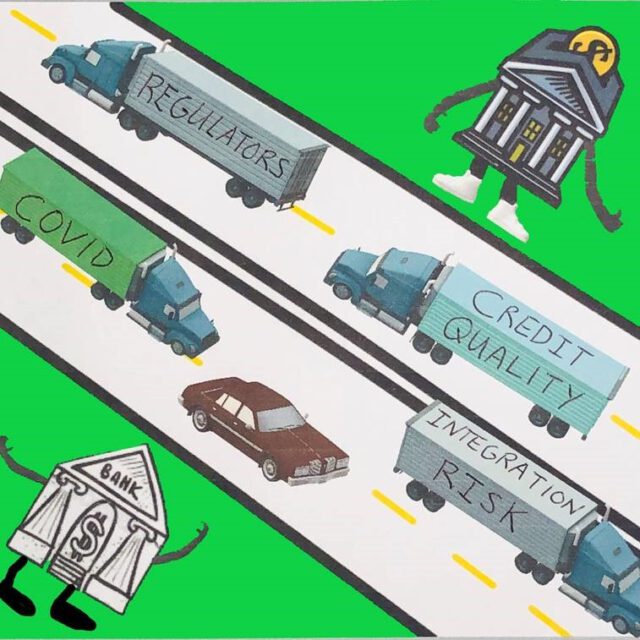|
|
Great leaders fit the needs of specific banks under specific circumstances. In this article, we profile three Florida bank CEOs to demonstrate how they were uniquely suited to three different leadership situations. Whether recruiting externally or grooming internal talent, banks not only must examine cultural fit but also competency fit. They must ask themselves: Which competencies do we need from our leaders? Who has them? Who needs to develop them, and how do we support their development?
John C. Corbett
In June, CenterState Bank and South State Bank completed an MOE resulting in a combined entity with roughly $35B in assets. The merger was the result of a relationship built over a decade. Corbett and South State CEO Robert Hill began consulting with one another on the heels of the last financial crisis, as both banks became active in acquiring failed banks from the FDIC. Through this relationship and a shared vision of the future of the industry, they decided to merge the two companies, with Corbett to serve as CEO and Hill to serve as Executive Chair.
Under Corbett’s leadership, CenterState grew through a combination of organic growth and numerous acquisitions. His leadership has allowed the company to successfully integrate and assimilate several different banks while maintaining high levels of performance, earning him respect as an industry leader.
Not all leaders have the right competencies to lead a bank through acquisitions and integration. Which qualities have made Corbett successful at such a critical juncture in CenterState’s history?
- Charismatic Leadership: According to those who work with him, Corbett is not a “big personality” leader. “John’s not the kind of guy who walks into a room slapping everyone on the back, telling jokes,” CFO Will Matthews says. “He’s got a quiet confidence about him.” With this confidence—and the humility, candor and integrity that mirror the firm’s culture—he easily gets others to align with his goals. Further, Corbett is highly approachable, which encourages those around him to provide him with honest feedback. With these qualities, he has attracted and retained an excellent leadership team, cultivating trust and collaboration. Further, he has a shown a knack for retaining top leadership talent in acquisitions, allowing CenterState to buy and operate healthy banks in their local markets.
- Analytical Thinking: Corbett is known as a cerebral type. “He’s a good thinker,” says Matthews. “He studies the organization, reads a lot about our industry and things that affect it, and knows a great deal about leadership. He talks to folks and synthesizes information. So, I would consider him very analytical.” This talent for analysis has allowed Corbett to shift from FDIC fire-sale acquisitions to purchasing healthy banks, which demands more scrutiny. He spends a great of time with their senior executives, learning as much as possible about their institutions to make sound decisions, which hinge on culture fit. Corbett has applied these same analytical skills and decision-making processes to developing fee-based businesses, including correspondent banking and wealth management.
- Communication: Corbett’s winning personality and verbal skills make him a powerful presenter. “John is a fantastic communicator who articulates his vision of CenterState and its culture,” Matthews says. Corbett characterizes CenterState’s culture as entrepreneurial, where integrity, energy and intellect are valued. He depicts the bank’s organizational structure as decentralized but united by systems and culture. In part, his ability to transmit what makes CenterState unique is what has made the firm attractive to investors and potential acquisitions. Moreover, his communication skills make him an effective leader. “He is comfortable in his own skin when speaking,” Matthews observes. “There’s a logical thought progression when he’s talking with a group of people. This is the reason he’s good at leading a meeting. You know it’s going to be focused on our priorities.”
Corbett is regarded as a “world-class dealmaker,” but he is much more than that. He is a leader who drives CenterState’s entrepreneurial culture and promotes teamwork, an ideal fit for an organization focused on both acquisition and organic growth.
Chip Reeves
In 2017, Beach Community Bank was in trouble. The bank had been under consent order since 2010, with a Texas ratio that spiked at 1319%. Chip Reeves and Carl Chaney joined the firm as CEO and Chairman, respectively, and spearheaded a $100M 363 sale that injected new life into the bank. In turn, Reeves and Chaney rebuilt the executive team, including a new CFO, CCO and two Tampa Market Presidents. In 2018, the Fed terminated its enforcement action. Since then, Beach has made a turnaround in financial indicators (e.g., ROAA, ROAE, NIM), while reducing its efficiency ratio. With success has come opportunity, including potential acquisitions. “We are not afraid of taking a look at a compelling fixer-upper and molding that into a performing aspect of our organization,” Reeves says.
Chip Reeves brought extensive leadership experience to Beach from his prior roles as Chicago Market President for Fifth Third and President/COO of Bank of the Cascades. Which leadership competencies allowed him to take Beach from distress to success in just 24 months?
- Motivation and Commitment: There are few CEOs in the banking industry who are as driven as Chip Reeves. In 2017, when he became CEO, the task of turning Beach around looked insurmountable. Reeves put great energy into unloading some of the bank’s non-performing assets and ORE, cleaning up its credit and getting it out from under enforcement. As Chairman Carl Chaney put it, “[Beach] had handcuffs and constraints in every imaginable area… and, one by one, getting those taken off was not easy, but Chip met each challenge.” This effort, along with the hard work he put in with capital markets connections, paid off in Beach’s quick recapitalization.
- Charismatic Leadership: Reeves’s hard work sets an example for his team. “Once in a while,” he says, “I need to be the guy who carries the flag, runs up the hill, and says, ‘This is where we’re going and here’s why. Follow me.’” Reeves inspires followers with ethics, clear communication, and compassion. During the ongoing COVID-19 crisis, he prioritized employee engagement, knowing that, unless he met his people’s basic needs—health, safety and financial wellness—they could not provide excellent service. While caring, Reeves sets a high bar for his team and expects them to meet it, driving them to overcome obstacles to the PPP rollout, for example. “Chip doesn’t accept ‘no’ easily,” Chaney says, “which I think is a great trait for a leader.”
- Teamwork: While Reeves can be a forceful leader, he is also an exceptional team builder. “I’d emphasize that both leadership and management come from the quality of the team,” he says, “and we have recruited an executive team that can execute with the best in the business, putting us in position to acquire.” Reeves has also attracted a talented production team, transforming Beach into a top-notch commercial lender positioned to grow organically. Executives and producers alike consider him a selfless team player, willing to work as hard and anyone in the organization. “I believe that you need to be action-oriented and optimistic,” Reeves states. “Also, it has to be about others versus yourself. That’s the only way you can sustain success.”
The revamped Beach Community Bank is testament to Chip Reeves’s leadership by example. His drive to succeed, his devotion to his people, and his willingness to roll up his sleeves have enabled him to assemble a team dedicated to his goal of growing Beach into a premier lender in Central Florida.
John K. Stephens
By 2013, Atlantic Coast Financial had lost money for 7 straight years and was under an OCC consent order. Management attempted to sell the bank to Bond Street Holdings, a deal turned down by Atlantic Coast’s shareholders. In November, Atlantic Coast hired John Stephens as its CEO. After raising capital and derisking the balance sheet, the bank turned a $1.4M profit, as its assets increased by $200M. The OCC order was soon removed, as the bank’s financials continued to improve. In 2017, Ameris Bancorp agreed to acquire Atlantic Coast for roughly $145M at 160% of TBV and 24.8x earnings.
Prior to arriving at Atlantic Coast, John Stephens had served as CLO of Fifth Third’s Central and North Florida affiliate banks, as well as President of Tower Bridge Capital, a private equity firm. Further, he had developed several critical skills that allowed him to take his career (and Atlantic Coast) to the next level.
- Communication: With a genial personality and a background in psychology, Stephens has a way with people. He exudes confidence and optimism about his institution in a way that inspires and motivates his people. At Atlantic Coast, he effectively communicated the bank’s goal—“to be the premier community bank in our markets and the markets we serve”—and got his people on board with it, in part by maintaining an open-door policy that got them to actively participate in process improvement. Communication helped Stephens lead the bank to a swift reversal of fortune, including on the revenue side. Moreover, his ability to transmit vision externally—to regulators, investors and capital markets professionals—was critical both in keeping the lights on at Atlantic Coast and in its $45M capital raise.
- Transformational Leadership: When Stephens arrived at Atlantic Coast, it was in disarray. Executive Chairman, Jay Sidhu, referred to outgoing executives as “self-serving and incompetent,” expecting a “night-and-day difference” with Stephens at the helm. The bank immediately issued stock that netted $45M, after which it reduced exposure to bad debt. Stephens bolstered the bank’s mortgage lending, business banking and branch network, hiring a large group of new associates. Through it all, Stephens emphasized teamwork and community leadership in the bank’s organic growth. “This was 100% a team effort, with everyone pulling together in the same direction,” Stephens commented.
- Planning and Organizing: At Atlantic Coast, Stephens set a three-pronged strategy—raising capital, cleaning up the balance sheet, and jump starting the revenue engines—which stockholders embraced. Rather than relying on acquisitions, Stephens achieved growth by hiring bankers in key markets, investing in technology, and improving customer service. He also streamlined the bank. For example, he improved Atlantic Coast’s credit process, such the bank was able to determine where a deal was headed within 30 minutes. “By doing that,” Stephens notes, “We could deliver in days and weeks what others took weeks and months to do.” As noted above, Stephens involves his people in process improvement. “Operational excellence,” he states, “was a matter of looking every single thing we do and challenging the process…. But they knew that if they came to me and said, “This isn’t working,” my first question was, “Well, what do you propose we do?”
John Stephens is an unusual CEO. Unlike many transformational leaders, he is more than a big picture guy who gets others on board with his bank’s vision. Stephens is also a disciplined planner who understands that, in an industry where services are commoditized, banks have to find unusual sources of competitive advantage. Meticulous planning and excellent communication skills allowed him to rebuild Atlantic Coast quickly and sell it Ameris. He was the right CEO at the right time.
Takeaway
In this article, we demonstrated how CEOs with unique competency sets fit their banks’ leadership situations. Here are our suggestions for what every institution should do:
- Develop a leadership model (including leadership style and competencies) linked to the bank’s business strategy;
- Implement a customized assessment which incorporates the leadership competencies; and,
- Apply the results of assessment to development, including competency-focused training to address weaknesses.
If you would like more information, The Travillian Group’s Advisory practice, TTG|Align, has deep experience in these areas and we would be happy to provide you with guidance.
The Travillian Group’s Banks and Credit Unions practice provides Search and Talent Advisory (TTG|Align) services to depository institutions across the country. Established in 1998, the firm has built a unique platform that touches every corner of the industry.
Our search and advisory professionals focus on building long-term, trust-based relationships with Boards, Executives and HR professionals. They assist our clients in the hiring of high quality, hard to find talent and provide full-life cycle consulting in such areas as succession management, leadership development, employee engagement, recruitment strategies and compensation.












